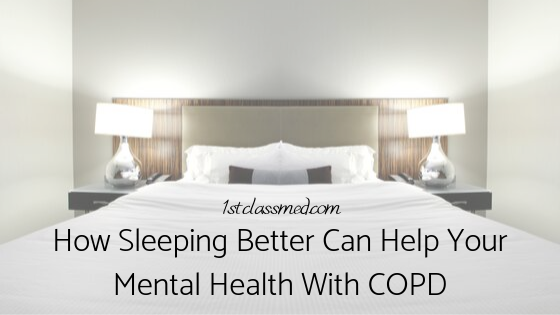
Sleep is one of the most important habits we have. When we are well rested, we are able to achieve more throughout the day, and our bodies benefit greatly. On the flip side, when we are getting poor sleep, we open ourselves up to a host of physical health problems, such as a weakened immune system, heart disease and multiple respiratory diseases, to name a few.
But quality of sleep influences much more than our physical health. If you struggle with one or more mental health conditions, inadequate sleep can exacerbate those issues, which then makes it more difficult to sleep. Low mental health can make day to day tasks more difficult for those with COPD or similar respiratory diseases. In order to break this vicious cycle, you must be proactive in improving your sleep habits. Fortunately, there are practical ways to do just that.
Look into Memory Foam
You probably know the importance of having a quality mattress. But do you know what to look for when shopping for a new one? There are so many different kinds of mattresses today that it’s easy to spend money on one that doesn’t meet your needs.
For instance, memory foam mattresses are designed for most body types and sleep styles, and they come in soft or firm, foam only or hybrid, and single or double-sided. Memory foam mattresses are also available in basically any price range, so no matter what your budget is, chances are you can find a mattress that fits. Just make sure to think about your firmness needs and sleep style when shopping.
Give Your Body and Mind Consistency
Setting a regular bedtime and wake time will help you sleep better, because your body and mind will know what to expect each night. Schedule your sleep like you would any other daily activity, and stick to it. It may take some time to get used to your bedtime. But waking up at the same time each morning—no matter how much sleep you got—will help you to feel tired by the time evening rolls around. Eventually, your body and mind should fall into the routine. This consistency can help your body heal and prevent a weakened immune system.
Connect Your Bedroom to Sleep
Reserving your bedroom for sleep is another great way to improve your sleep. Rather than working on your computer, watching TV or reading in your bedroom, designate the room solely for sleeping, and do all other activities in another room. Also, make sure the atmosphere in your bedroom is right: It should be cool, dark and quiet. The goal is to make it easy for you to fall asleep once you go to bed.
Practice Basic Self-Care

Self-care plays a major role in quality of sleep. Try to eat a healthy, balanced diet each day, and refrain from excessive caffeine and alcohol, which can keep you up at night. Also, exercise regularly (30 minutes a day, five days a week). This can be difficult for those with COPD, but even simply walking for 30 minutes is good for your health. Before bed, doing gentle yoga poses or relaxing stretches can promote sleep.
Speak with Your Doctor
While these tips have helped a lot of people improve their sleep, they are no substitute for medical expertise. If you try making these changes and your sleep problems persist—or become more severe—make an appointment with a medical professional. A doctor will be able to evaluate your specific needs and make recommendations as to how to handle the issues.
Conclusion
Poor sleep can pose significant consequences for your mental and physical health. Consider getting a new mattress that fits your body type and sleep style, and establish a consistent bedtime and wake time. Also, use your bedroom only for sleeping, eat well and exercise regularly, and consult your doctor about problems if they continue or get worse. One of the most effective ways to combat mental health issues is to get a good night’s sleep, so it’s essential to do whatever you can to make that happen.
About Brad: Brad Krause created Self Caring after years spent putting his own self-care on the back burner. His goal now is to educate people on the importance of self-care by providing tips and tricks that are easy to implement.



